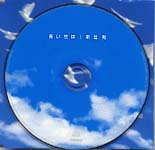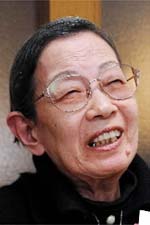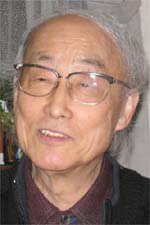"Blue and Clear Sky" Words by Kyoko Komori, Music by Susumu Onishi

|
|
Lyrics written as "a mother of Hiroshima"
Music composed with focus on "we all hope to leave to our children"

Kyoko Komori Born in Tokyo in 1930. An official of an association of poets. While working as a poet and writer, she is a member of the board of two organizations, one engaged in protecting children and one engaged in peace efforts, among other activities. |

Susumu Onishi Born in Mie Prefecture in 1931. A composer and a choral director. He has composed many choral pieces on peace or for children including "Ninoshima" and "Song for Oleander." |
The song "Blue and Clear Sky" was written in 1971. Japanese people of all generations, from the young to the old, are familiar with this song. It has become one of the most widely sung peace songs in the country.
The song was conceived in response to a call from peace groups and others to create a new song that would follow in the tradition of the well-known song "No More Atomic Bombs" (1952). At first, though, Kyoko Komori, who wrote the lyrics, hesitated to take up the challenge, as she thought, "The A-bomb experience is different from other experiences of war. Only the A-bomb survivors know the truth. I'd like to write the song, but do I have the right, if I'm not an A-bomb survivor?"
However, an experience that had occurred to her overseas gave her the encouragement to pursue the song.
In 1961, while busy raising her two children, she and her family moved to Prague in the former Czechoslovakia due to her husband's work. She was 31 years old at the time. The following year, on June 10, she visited the village of Lidice, outside of Prague. Lidice is the village that the Nazis razed to the ground in 1942.
She met an old woman in the village. The woman was in the group welcoming visitors stepping off her tour bus. When she saw Ms. Komori and her children, she asked, "Are you Chinese or Japanese?" As soon as she replied, "We're Japanese," the woman embraced Ms. Komori and shouted, "Hiroshima! Hiroshima!"
"Hiroshima? Because we're Japanese?" At that moment she realized that Hiroshima was a word common to the world. A tear rolled down the old woman's wrinkled cheek. Recalling this experience, Ms. Komori decided to write the words for the song as "a mother of Hiroshima."
The first verse is about Hiroshima on August 6, 1945; the second verse is about the anniversary of August 6 each year; and the third verse is a call to end war in the world.
Mr. Onishi, who wrote the music for the song, took note of the line "we all hope to leave to our children" at the beginning. He thought, "I felt the strong conviction of the writer, in choosing not to simply express the idea with 'let's leave to our children.'" Thus, he chose to put emphasis on the line when composing the melody.
"Misery (first verse), requiem (second verse), and belief in the future (third verse). Each verse has a different power and needs a different melody. By emphasizing the repeated part, 'we all hope to leave to our children,' the song became rhythmic," Mr. Onishi explained. More recently, he has written music to poems by Misuzu Kaneko. He said, "When I perform overseas, I try to include this song in all my performances." (Kenji Nanba, Staff Writer)
|